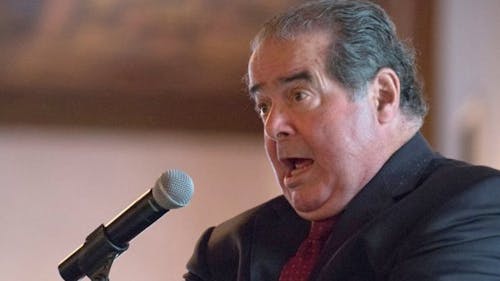Rutgers professor talks ramifications of Antonin Scalia's death

Following the death of Supreme Court Justice Antonin Scalia on Feb. 13, controversy has erupted surrounding President Barack Obama’s right to nominate a successor to the now-vacant seat.
In a move Politico called a “historic rebuke” of the Obama's authority, Senate Majority Leader Mitch McConnell (R-Ken.) called for a halt to the nomination process, demanding the nominations be held only after a new president takes office.
“The American people should have a voice in the selection of their next supreme court justice. Therefore, this vacancy should not be filled until we have a new president,” McConnell said in a statement released hours after Scalia’s death.
Ross Baker, a distinguished professor in the Department of Political Science, said the Republican Party has a number of options available to block the nomination.
The Thurmond Rule, named for the late Sen. Strom Thurmond (R-S.C.), states that candidates for the Supreme Court should not be confirmed during the last six months of a lame-duck presidency, according to Politico.
In 2008, McConnell himself challenged the rule’s legitimacy, saying that “this seeming obsession with this rule that doesn't exist is just an excuse for our (Democratic) colleagues to run out the clock on qualified nominees who are urgently needed to fill vacancies.”
The other side of the aisle is little different. In a 90-minute 1992 address to the Senate, Vice President Joe Biden, then a Democratic senator from Delaware, called on then-President George H.W. Bush to delay nominations until the year’s election had passed.
Baker said he did not support the rule and its use as a political roadblock.
“(The Thurmond Rule is) not a rule at all. It's something that happened. They gave it a label and they exulted it to the status of a thing that should be taken seriously,” he said.
Regardless of the rule’s legitimacy, the nominations may be blocked. As Senate Majority Leader, McConnell enjoys a number of privileges, including the ability to schedule the senate’s activity, Baker said. If McConnell does not schedule a confirmation vote, there will be no vote.
If McConnell chooses this option, the Obama’s only recourse would be a recess appointment, which can only be made when the Senate is in a formal recess, he said. This option, like others, can be blocked.
“(Republicans could) maintain what they call a ‘pro forma session,’ which is basically (when) a couple of senators hang around Washington, usually ones from states that are closest to Washington, D.C., and go through the charade of actually conducting business,” Baker said. “It's basically a way to constitutionally block the president from making a recess appointment.”
To increase the chances of a Supreme Court nominee being confirmed, Obama may choose to nominate a moderate, possibly even a Republican, said Richard Lau, a professor in the Department of Political Science.
Appointing a Republican would make it harder for the senate to block the nomination, he said. By nominating a Republican, the president would force Republican senators into a compromising position — they either slam one of their own or they appease the president.
With the election so far away, the dispute is mainly about influencing public opinion, Baker said.
“This is all about messages. Clearly the Democrats have no realistic hope that the Senate will confirm a nominee by the president,” he said. "The Republicans, on the other hand, are confident they can block it, so it all comes down to the messages that both the Democrats and the Republicans send out.”
____
Nikita Biryukov is a School of Arts and Sciences junior majoring in journalism and media studies. He is an associate news editor for The Daily Targum. Follow him on Twitter @nikitabiryukov_ for more.



